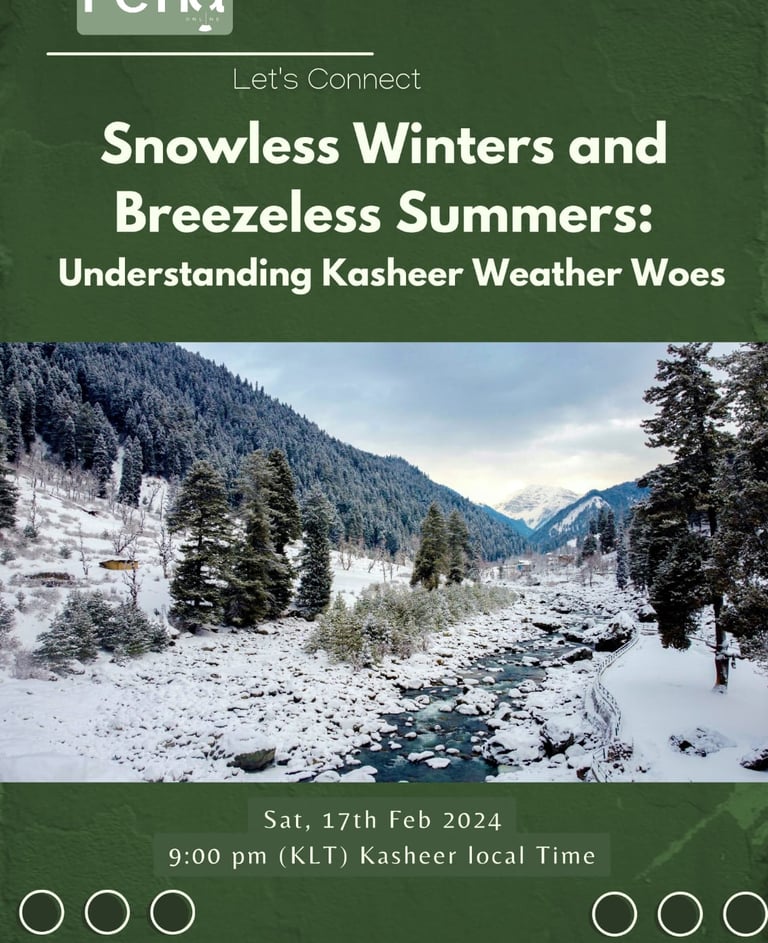Snowless Winters and Breezeless Summers: Understanding Kashmir Weather Woes
SOCIETYEARTH AND ENVIRONMENT


In this engaging panel discussion, two experts—Dr. Amjad M Hussaini, a senior scientist and professor of plant biotechnology at SKUAS-Kashmir, and Dr. Mohammad Rafiq, a geo-informatics expert working with the Ministry of Environment, Forest and Climate Change in New Delhi—explore the unusual climatic shifts observed in Kashmir. The discussion, hosted by Touseef Yusuf, delves into the phenomena of snowless winters and breezeless summers and their cascading effects on the region's environment, agriculture, and local communities.

Key Themes and Objectives
The panel aimed to:
Unpack the Changing Climate: Explore how rising temperatures and altered weather patterns are leading to diminished snowfall in winters and reduced wind activity in summers.
Assess Impacts on Ecosystems and Agriculture: Understand the effects of these changes on plant biodiversity, crop productivity, and overall ecosystem health.
Discuss Data and Policy Implications: Highlight geo-informatics and meteorological data that inform current climate trends and suggest adaptive strategies.
Propose Collaborative Solutions: Encourage partnerships between academic institutions, government agencies, and local communities to address these environmental challenges.
Expert Insights
Dr. Amjad M Hussaini – Plant Biotechnology Perspective
Dr. Hussaini offered a deep dive into how Kashmir’s shifting weather patterns are impacting its natural ecosystems:
Impact on Plant Life:
He explained that the loss of regular snowfall and altered seasonal winds are changing soil moisture levels and temperature regimes, which in turn affect the growth cycles of native plants. These changes have a direct bearing on agricultural productivity and the sustainability of traditional crops.Adaptation and Resilience:
Highlighting ongoing research at SKUAS-Kashmir, Dr. Hussaini discussed innovative strategies in plant biotechnology aimed at developing crop varieties that are more resilient to these climatic shifts. His emphasis was on the need for adaptive breeding techniques and genetic research to safeguard food security in the region.Ecosystem Implications:
The discussion also touched on how altered climatic conditions could disrupt local biodiversity, potentially leading to the loss of species that depend on predictable winter snow and summer breezes.
Dr. Mohammad Rafiq – Geo-Informatics and Climate Data Perspective
Dr. Rafiq provided a complementary viewpoint focused on the broader meteorological and environmental data:
Climatic Data and Trends:
He presented findings from satellite imagery and long-term meteorological records that indicate a clear trend towards warmer winters with significantly reduced snowfall. Additionally, he noted that summers are exhibiting fewer breezes—a change likely linked to shifts in regional pressure systems.Geo-Informatics Applications:
Dr. Rafiq stressed the importance of geo-informatics in monitoring these trends. By integrating spatial analysis with climate data, researchers can better predict future weather patterns and assess the risk of further environmental degradation.Policy and Mitigation Measures:
He discussed potential policy interventions, including reforestation programs and the development of early-warning systems, aimed at mitigating adverse impacts. Dr. Rafiq also highlighted the need for robust collaboration between scientific research and governmental planning to build climate resilience in the region.
Discussion Highlights and Recommendations
The dialogue between the two experts provided a multi-layered understanding of Kashmir’s weather woes:
Interconnected Effects:
Both experts agreed that the observed weather anomalies are not isolated incidents but part of a broader trend likely driven by global climate change. These changes are affecting not only natural ecosystems but also human livelihoods.Urgency for Adaptive Strategies:
They stressed that immediate steps are needed—ranging from enhancing agricultural practices to investing in sustainable infrastructure—to adapt to the new climatic realities.Collaborative Research and Policy Making:
The session underscored the importance of interdisciplinary collaboration. By combining plant biotechnology research with geo-informatics and meteorological data, more comprehensive adaptation strategies can be formulated.Community Involvement:
Both speakers highlighted the need to involve local communities in adaptation efforts, ensuring that traditional knowledge is integrated with modern scientific approaches.
Conclusion
The panel discussion on "Snowless Winters and Breezeless Summers" provided a critical look at the evolving climatic challenges in Kashmir. Dr. Amjad M Hussaini’s insights into the biological and agricultural implications, combined with Dr. Mohammad Rafiq’s data-driven analysis, paint a comprehensive picture of the region’s weather woes. Their discussion calls for urgent adaptive measures and robust collaborations between academia, government, and local communities to protect Kashmir’s environment and ensure sustainable development.
This session serves as a wake-up call for policymakers and stakeholders, emphasizing that proactive and interdisciplinary strategies are essential to navigate the uncertain future of Kashmir’s climate. The integration of cutting-edge research and practical policy solutions holds the promise of building resilience in a region deeply affected by global environmental change.
